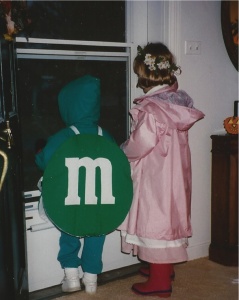
The day before she planned to board a plane to Chicago for Christmas, my sister-in-law tripped on the stairs of her home, tumbling all the way to bottom. Fortunately, she was able to call a neighbor, who drove her to the hospital, where doctors diagnosed a nasty concussion and badly sprained ankle.
Advised not to fly for at least a week, she spent the holiday alone, half a country away from the family who loved her. It was not the annual reunion any of us had hoped for.
It could have been so much worse, of course, as we told ourselves repeatedly over the next few days. Living alone, she may have lain unconscious for hours before someone found her. She could have been permanently injured, even killed. The possibilities don’t bear thinking of.
She was, in fact, lucky. Yet luck is a relative term.
I’ve struggled with this kind of contradiction often since my son’s diagnosis, seeking the bright side, the countless positives in Daniel’s life to counter the implacable weight of autism. These self-imposed pep talks seldom evoke the level of gratitude I believe I should feel, however, or appreciation for the grace I’ve been granted, again and again. How often have I told myself that what I have, what my son has, should be enough, even as my self-pity shouts me down: “Of course it could be worse! Of course it could! But it’s bad enough as it is!”
Slowly, though, I’m emerging from this kind of wallowing. This past Christmas I realized that, perhaps, I’m making some progress after all. And I don’t know how I feel about that. It’s taken me weeks to wrestle my emotions into cohesion.
We brought Daniel home for a day visit on Christmas Eve, an excursion we haven’t attempted in several years. It’s easier on everyone, including him, to simply celebrate at his group home in Wisconsin, rather than tempt the erratic behavior that makes his living there necessary with transitions back and forth from the environment he’s grown accustomed to over the years.
This year, however, I decided to try again.
The holiday season is not particularly joyful for me, and despite my grim resolve each year to make it so, over the last decade it’s become a period to be endured rather than savored. Exceptional work demands at the close of last year had me more anxious than ever, and a wise friend urged me to set aside, just this once, a few of the traditions I’ve felt duty bound to maintain, even as they brought more stress than satisfaction. I tried to take her advice. Christmas 2016, for instance, marked the first year since my children were born that I didn’t include their photo with my Christmas cards. And what do you know? The world survived, just fine.
Maybe this frame of mind helped ratchet down my expectations for Daniel’s visit, let go just a bit of my perfectionism and take the day as it came. It didn’t have to be perfect; almost certainly it wouldn’t be. And indeed, it wasn’t.
My Facebook post that afternoon painted an idyllic portrait of family togetherness, drawing supportive comments from my circle of friends. My daughter, her boyfriend, and their enchanting puppy were home as well; we dined at Denny’s, Daniel’s favorite restaurant, and exchanged gifts around a glowing Christmas tree.
Pictures rarely tell the whole story, of course.
I’d planned to give Daniel his Christmas stocking, bulging with favored treats, before leaving for lunch, but he showed little interest, leaping from the sofa and pointing to the door — “Denneh? Denneh?” — again and again until we tossed the stocking aside in resignation.
At the restaurant he was allowed soda to his heart’s content, but this did nothing to slake his obsession with the beverage, demanding more as soon as we got back in the car. Nine years after leaving Illinois, he still remembers the precise location of the grocery store nearest our house, and pointed in its direction as we drove quickly home, praying he wouldn’t wet his pants before we got there, a very real possibility due to his public bathroom aversion.
Back in the living room once again, we tried enticing him with the mountain of merrily wrapped gifts assembled under the tree. He was having none of it. “Stoar? Stoar?” His requests became more belligerent as I tried coaxing him with a sticker book, my well-stocked refrigerator sadly lacking the 16-ounce bottle he apparently had in mind.
“Stoar!”
One photo I posted on Facebook was especially popular, my once-little boy now towering over me, hands on my shoulders, looking deeply into my eyes as I smiled up at him with joy. It elicited tender comments from far and wide.
“I can see the love in this picture!”
“You are his world!”
“This picture says so much!”
It said plenty, all right. It said our whole happy Christmas visit had been hijacked by Daniel’s unremitting obsession; that I was desperate for the holiday’s magic to break the vicious hold of autism for just one day. That as that photo was snapped, he’d just released my chin after pulling my face to his, laser-focusing as he repeated, again and again, “Stoar? Stoar? Stoar?”
We gave in. Armed with a bottle of Coke Zero chosen from the gas station minimart, Daniel finally relaxed, giggling, posing for photos, enjoying time with his family before Andy drove him, happy and willing, back to his Wisconsin home.
It was an exhausting afternoon, another celebration driven by the disorder that has dictated the course of our lives. But while the day failed to unfold as smoothly as I had hoped, it didn’t crush me as some past Christmas ordeals have done.
I don’t know why this was so. Was it because my daughter was so obviously happy, or that her boyfriend touched me so deeply with his maturity, his affection and respect for his girlfriend’s special brother? Was it the joy of their dog Mattie’s exuberance, the fun of having a puppy in the house? Was it that we made it through lunch at a restaurant without incident, no hapless diner’s soda wrenched from their unsuspecting hands?
Did the positive, this time, simply outweigh the negative?
I can hardly believe it’s that easy, because I don’t do simple very well. Separating my feelings around Daniel’s disability from the rest of my life is an ongoing challenge; his autism colors everything in my world. With Daniel’s struggles so blatantly on display, enjoying a festive holiday feels like a betrayal, acceptance a sell out to my own longing for harmony, for normalcy, for simple. Daniel’s reality is my own, and conceding that it is good enough is defeat, like giving up on a Christmas photo.
A mere bottle of soda satisfied my son, but that wasn’t the way I wanted it: I wanted my will for Daniel to prove stronger than his fixation, than his disorder itself. That kind of transformation doesn’t happen very often with autism. I know this by now. I still hope for it, though, unwilling to accept circumstances as they are because they could be, should be, so much better.
Yet this year I felt the grace of truth more powerfully: those circumstances could be worse.
And I hold these truths now as well: Daniel’s smile as he ran from Andy’s car to our back door, beaming, eager to be home again; his delight as Mattie pranced on his bed, licking his hands and face while I tightened his shoelaces and brushed back his hair. His careful examination of the tree ornaments, touching, tapping, as he did when he was a boy. His willingness to return at the end of the day to the life he knows now and embraces, untroubled, secure in our bond and our love.
For a few hours on Christmas our family was together. Imperfect, stumbling, winging it, but together.
And this time — dare I say it? — that was good enough.





